Mary Talks: “Farmer Legacy: 2020 & Beyond”
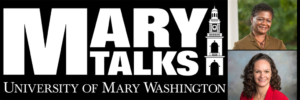
Join us ONLINE for the next Mary Talk of the 2020-21 academic year!
In January 2020, UMW launched Farmer Legacy 2020: A Centennial Celebration and Commitment to Action to recognize what would have been the 100th birthday of Dr. James Farmer, national civil rights icon and Mary Washington College professor from 1985 to 1998. While the pandemic changed the direction of our yearlong commemoration, it did not shake our commitment to honor Dr. Farmer and to realize his vision for a more equitable America. Our next Mary Talk will explore Dr. Farmer’s life and legacy and his ongoing impact at Mary Washington today.
This Talk will be presented by Farmer Legacy co-chairs Dr. Sabrina Johnson (Vice President for Equity and Access) and Dr. Juliette Landphair (Vice President for Student Affairs) along with Jason Ford ’20 (leader of the Black Alumni Affinity Group). They will discuss Dr. Farmer’s impact and UMW’s ongoing commitment to inclusive excellence. We will hear from alumni who recall Dr. Farmer as a remarkable historian and teacher. We will recount our trip with President Troy Paino and others to Capitol Hill to visit the legendary Representative John Lewis, who participated in the Freedom Rides with Dr. Farmer and served as the Farmer Legacy’s honorary Chairperson. We will examine the context of Dr. Farmer’s life and legacy as well as our progress in equity and inclusion efforts at UMW.
Wednesday, December 9
7:30-9:00 p.m.
Online
To watch the Talk online, register here. You then will receive a link to the streaming video, which can be watched live or at a later time. You also will have the opportunity to submit questions to be asked of the speaker at the end of the Talk.
Note: Online viewing is the only option for this Mary Talk, as we are not conducting any in-person events at this time.
We look forward to seeing you online!
Invitation for James Farmer Multicultural Center Updates
UMW Faculty and Staff:
The James Farmer Multicultural Center (JFMC) invites you to join an email list to receive weekly updates about events this year, which are continuing to be held in a virtual format. You can participate in events that interest you, share information about events with your students, or contact the JFMC to co-sponsor one of the cultural or social justice programs that aligns with your class syllabus or personal interests. It is always appreciated when you invite students to attend events as part of your class activities!
The JFMC strives to facilitate students’ learning and personal development, including that of underrepresented groups, by increasing students’ awareness and knowledge of diversity issues (i.e., cultural, ethnic, intellectual, and social) that frame both the individual and the community. The Center creates educational environments that broaden one’s understanding and appreciation of multiculturalism, diversity, and social justice. The JFMC also provides programs and services and activities to increase the awareness of Dr. James Farmer’s legacy and contributions to society.
More than 11 cultural celebrations are sponsored and various social justice initiatives (e.g., Social Justice Teach-Ins, Human Rights Film Series, and the Social Justice and Leadership Summit) are hosted throughout the year. For more information about the JFMC, visit the Center’s website.
Please fill out this Google form if you would like to be added to the list for a weekly email that will include information about upcoming events, as well as flyers and promotional materials for you to distribute to your students. If you opt in now and want to be taken off the email list later, just contact the JFMC at umwjfmc@gmail.com. Thank you for your support of the ASPIRE-aligned work of the JFMC!
Best regards,
Dr. Melissa Wells, Chair, JFMC Faculty Advisory Council
Dr. Marion Sanford, Director of the James Famer Multicultural Center
Social Justice Summit Spurs Students to Action
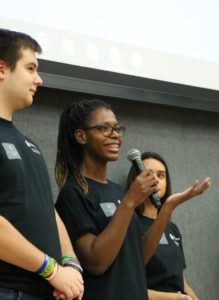
UMW students speak at a previous Social Justice and Leadership Summit, presented by the James Farmer Multicultural Center. Covering topics like systemic racism, housing injustice, immigration and climate crisis, this year’s full event was held last weekend, while a smaller event was held during the summer.
When junior Mandy Byrd came to the University of Mary Washington, she got involved with the James Farmer Multicultural Center (JFMC) and the University’s new NAACP chapter. These organizations helped open her eyes to a wide range of social justice issues, she said, and “just how powerful this kind of work can be.”
Her goal is to devote the rest of college – and beyond – to educating people about injustice and encouraging conversations that result in “positive and lasting change.”
She did both last Saturday, when JFMC hosted its Social Justice and Leadership Summit on Zoom. Dozens of Mary Washington students joined high school and community college students from the Fredericksburg area, as well as UMW faculty members and guest speakers, engaging in a virtual dialogue about pressing issues currently impacting our country and planet. Held annually since 2018 – usually in person – the summit gives students, according to the website, “the chance to build coalitions across cultural barriers, strengthen advocacy and promote a more equitable culture and climate at UMW and in American society.” Read more.
Landphair Pens Column on John Lewis in Richmond Times-Dispatch
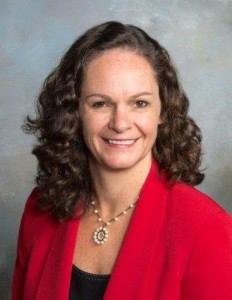
Vice President of Student Affairs Juliette Landphair
Vice President of Student Affairs Juliette Landphair, who is the Farmer Legacy 2020 co-chair, penned a column in The Richmond Times-Dispatch on the late Rep. John Lewis’ legacy and the impact that he and Dr. James L. Farmer Jr. have had on the University of Mary Washington and its students.
Sixty years ago, much like today, many American young adults were on fire to dismantle racial discrimination. U.S. Rep. John Lewis, D-Ga., who recently passed away as an international icon for civil rights and public service, was one of them. Born in 1940 into a tenant farming family in Pike County, Ala., where half of their cotton crop’s earnings went to the white landowner, Lewis grew up in a poor, rural part of the nation completely alien from stereotypical recollections of 1950s consumerism and suburbanization. As historian Dr. Andrew Lewis recalls, John Lewis’ childhood “conjures up a world that the twentieth century seemed to have passed by.”
While in college at American Baptist Theological Seminary in Nashville, Tenn., Lewis became active in civil rights protest. Over a few critical months in late 1959 and early 1960, he and other young activists, including the extraordinary (and not enough remembered) Diane Nash, attended workshops on nonviolence and its philosophical roots, taught by the minister James Lawson. Principles such as the power of the collective and the redemptive community settled into Lewis’ conscience and remained the rest of his life; he later described “crossing over” into a lifelong commitment to the movement in 1960 while participating in the Nashville sit-ins.
At my institution, the University of Mary Washington (UMW), Lewis figures prominently in our story. We like to think it is a special bond, but of course, Lewis made all admirers feel important. In 1961, Dr. James Farmer, leader of the Congress of Racial Equality (CORE), who later became a Mary Washington College professor, helped recruit the 21-year-old Lewis to join 12 others on the Freedom Rides. They would travel on two buses through several Southern states challenging interstate transportation facilities. During the Rides, Lewis was attacked by angry whites in South Carolina and Alabama.
More recently, Lewis agreed to serve as honorary chair of Farmer Legacy 2020, UMW’s yearlong celebration of the 100th anniversary of his friend Dr. Farmer’s birth. This past November, in his official acceptance of his chairperson role, Lewis met with a small UMW delegation in his Capitol Hill office for nearly an hour. I was fortunate to be among the attendees. With his celebrated warmth and humility, he spent nearly an hour with us, asking about UMW and our lives, and sharing stories. He especially was attentive to Jason Ford, our Student Government Association president who, as a black man himself, knew he was in the presence of a giant on whose shoulders he stood. Read more.
James Farmer Multicultural Center Thanks #UMWRun4Justice Participants
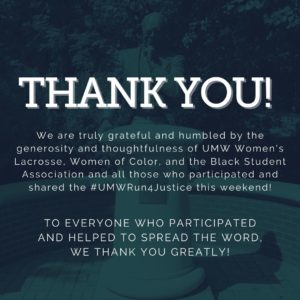 The James Farmer Multicultural Center thanks everyone who participated in the Virtual #UMWRun4Justice 5K this past weekend, especially UMW Women’s Lacrosse and Coach Maddie Taghon, Women of Color, and the Black Student Association, as well Alumni Relations for help with spreading the word. The event raised $2900 that will be used in support of the Black Lives Matter movement and other social justice initiatives at UMW. The desire is to create opportunities to help open conversations and develop a more inclusive campus. Please enjoy the video below of JFMC Director Marion Sanford thanking participants.
The James Farmer Multicultural Center thanks everyone who participated in the Virtual #UMWRun4Justice 5K this past weekend, especially UMW Women’s Lacrosse and Coach Maddie Taghon, Women of Color, and the Black Student Association, as well Alumni Relations for help with spreading the word. The event raised $2900 that will be used in support of the Black Lives Matter movement and other social justice initiatives at UMW. The desire is to create opportunities to help open conversations and develop a more inclusive campus. Please enjoy the video below of JFMC Director Marion Sanford thanking participants.
UMW Chooses New Name for Building: James Farmer Hall
The University of Mary Washington Board of Visitors today voted to change the name of Trinkle Hall to James Farmer Hall. With this action, the Board memorialized a beloved member of the Mary Washington community who spent most of his career fighting injustices.
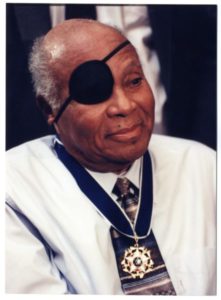
University of Mary Washington’s Board of Visitors voted to change the name of Trinkle Hall to James Farmer Hall. Dr. James L. Farmer Jr., one of the “Big Six” leaders of the civil rights movement, spent his final years as a professor of history at Mary Washington. Photo by Suzanne Carr Rossi.
“I commend the action of the Board today,” said Rector Heather Crislip. “We are talking about one of the most beautiful and iconic buildings on campus, and its name should reflect our community and our values.”
The vote to change the name of this building comes at a pivotal time in our nation’s history. Today’s action was precipitated by the exhaustive work of UMW’s Campus Environment Presidential Ad Hoc Committee. That group was charged in 2017 with evaluating campus art, monuments, and other representations of the University’s history and community in order to ensure that Mary Washington is a welcoming environment for all.
In its subsequent 74-page report presented to the Board in November 2019, the committee’s research revealed that certain works of art and artifacts present a one-dimensional interpretation of UMW’s history. The Board unanimously voted to endorse all 17 of the committee’s recommendations for addressing the issues, with the greatest urgency placed upon identifying a new name for Trinkle Hall, named for a former governor of Virginia who was an active proponent of eugenics and segregation. The board further directed that the new name provide an opportunity for celebration, positive growth, and affirmative identity of the campus.
Earlier this year, a Naming Committee of UMW alumni, faculty, staff, and students solicited nominations for consideration. The committee then narrowed the field by tallying the top five nominees, surveyed the community regarding these nominees, and conveyed the results to President Troy Paino, who voiced his support of the committee’s recommendation to the Board. Read more.
UMW Celebrates 30th Anniversary of Americans With Disabilities Act
When UMW junior Lueden Sheikhnureldin arrived at Simpson Library that early fall morning, something felt off. The old-style wooden chairs in the study area where she’d crammed for so many exams had been replaced by sleek gray-and-green seats.
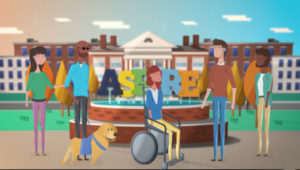
UMW’s Office of Disability Resources offers access to students in need, with 12 percent of students registered to receive its services. This month, the University is celebrating the 30th anniversary of the Americans With Disabilities Act of 1990.
“I couldn’t concentrate,” said Sheikhnureldin, whose ADHD can cause sensitivity to details like a chair’s texture and feel. “I thought, ‘This is confusing. Everything is changing. I can’t do this.’” She retreated to her Madison Hall room, instead, to study for a biology test.
An English major pursuing a degree in education, Sheikhnureldin is one of hundreds of UMW students with disabilities ranging from ADHD and autism to issues with vision, hearing and movement. “There really isn’t a category that isn’t represented here,” said Jessica Machado, director of the Office of Disability Resources (ODR), which provides services, accommodations and access.
It’s one of the most utilized offices of its type in Virginia, Machado said, with 12 percent of Mary Washington’s more than 4,000 students registered. That’s particularly poignant this month, while the Americans with Disabilities Act (ADA) celebrates its 30th anniversary. UMW officials like Machado are using the milestone to recognize three decades of strides toward equality for the disabled and also the work left to do.
“We must directly challenge the assumptions and effects of ableism and work to ensure that every member of the UMW community can realize their goals and aspirations here, and that all of us together thrive and flourish,” Provost Nina Mikhalevsky wrote in an email to campus. Read more.